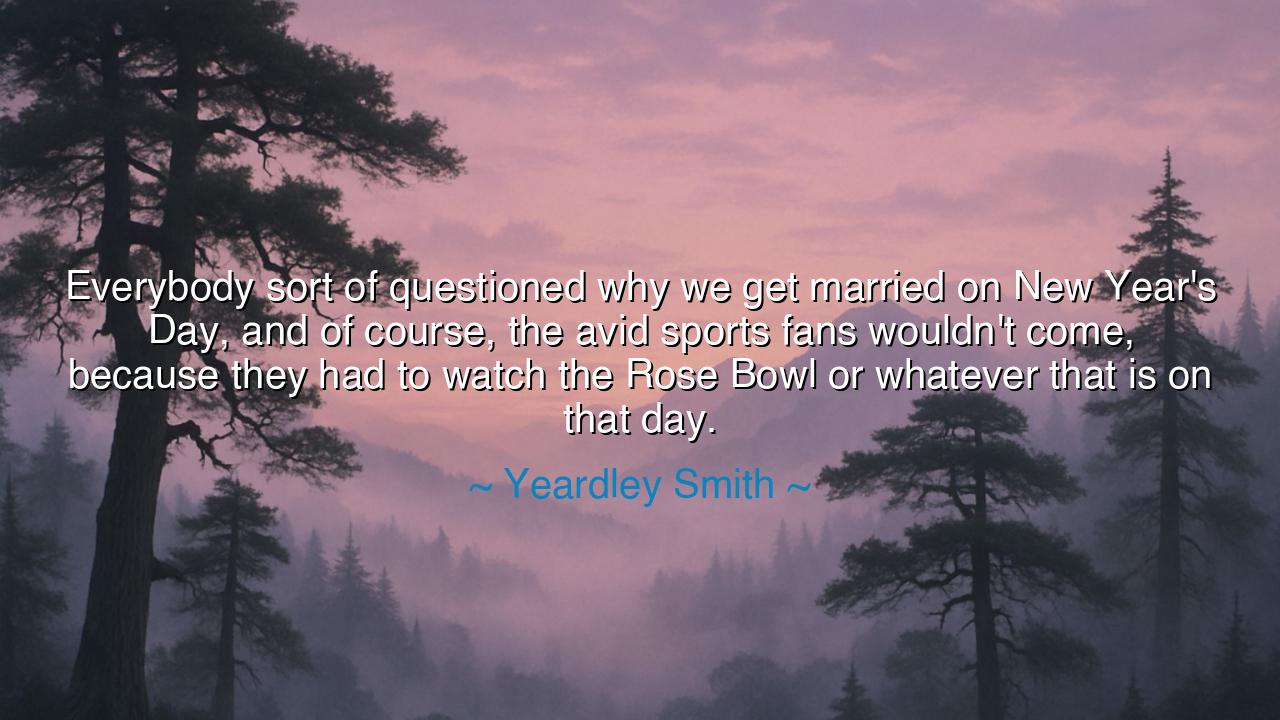
Everybody sort of questioned why we get married on New Year's
Everybody sort of questioned why we get married on New Year's Day, and of course, the avid sports fans wouldn't come, because they had to watch the Rose Bowl or whatever that is on that day.






Hear the playful yet poignant words of Yeardley Smith, who declared: “Everybody sort of questioned why we get married on New Year’s Day, and of course, the avid sports fans wouldn’t come, because they had to watch the Rose Bowl or whatever that is on that day.” At first, the saying rings with humor, the light jest of a bride noting who valued a game above a wedding. Yet beneath the wit lies a deeper truth: the way human beings weigh their loyalties, how they choose between rituals of the heart and rituals of the crowd. In her words, we see the eternal tension between devotion to love and devotion to spectacle.
The meaning of her remark is twofold. On the surface, Smith speaks of the surprise that a day as sacred as a wedding could compete with a sporting event. But in essence, she reveals that in life, people often exalt what is familiar and comfortable—even the cheering of the Rose Bowl—above what is truly transformative. A wedding is a covenant, the forging of a new household, the creation of a bond that echoes into future generations. A game, no matter how grand, fades when the day is done. Yet for some, the roar of the stadium outweighs the whisper of vows.
The origin of this truth lies in the nature of human celebration. Since ancient days, festivals, contests, and games have drawn the people together. The Greeks gathered for the Olympic Games, halting wars to witness the feats of strength and speed. The Romans filled their coliseums to see gladiators contend, often preferring such blood and glory to quieter acts of family devotion. And even in these modern times, the pageantry of sport commands such loyalty that men and women forsake all else to attend. Smith’s jest echoes this ancient pull: the heart of the people is ever torn between love of spectacle and love of the intimate.
Consider the tale of Marcus Tullius Cicero, the Roman orator. He once lamented that while he spoke words that might shape the fate of the Republic, the masses poured instead into the amphitheater, eager to see actors, contests, and games. What was profound was neglected for what was entertaining. So too, Smith found her covenant of love competing against the Rose Bowl, reminding us that human beings often exalt noise over substance, play over permanence.
The lesson is clear: one must learn to discern between the temporary and the eternal. Games, festivals, and spectacles bring joy, but they pass quickly, leaving only memories of scores and plays. A wedding, a bond of love, or any act of deep human connection endures long beyond the moment. It shapes families, communities, and generations. To choose entertainment above such things is to grasp at smoke while letting diamonds slip through one’s hands.
Practical actions must follow. In your own life, choose to honor moments of depth over distractions. When a friend invites you to a milestone, be present, for that presence will live in their memory long after the final whistle of a game is forgotten. When family calls, answer with devotion, even if the world tempts you elsewhere. Guard your loyalties with wisdom: let spectacle delight you, but let love and covenant rule you.
And so, child of tomorrow, take Yeardley Smith’s lighthearted words as a serious teaching. Do not forsake the sacred for the trivial. Games will come again, but moments of love, of marriage, of life’s milestones, will not. Celebrate them with full heart, for they are the true victories, the ones that do not fade with the turning of seasons. Remember always: the roar of a stadium dies at dusk, but the vow of love endures into eternity.






AAdministratorAdministrator
Welcome, honored guests. Please leave a comment, we will respond soon